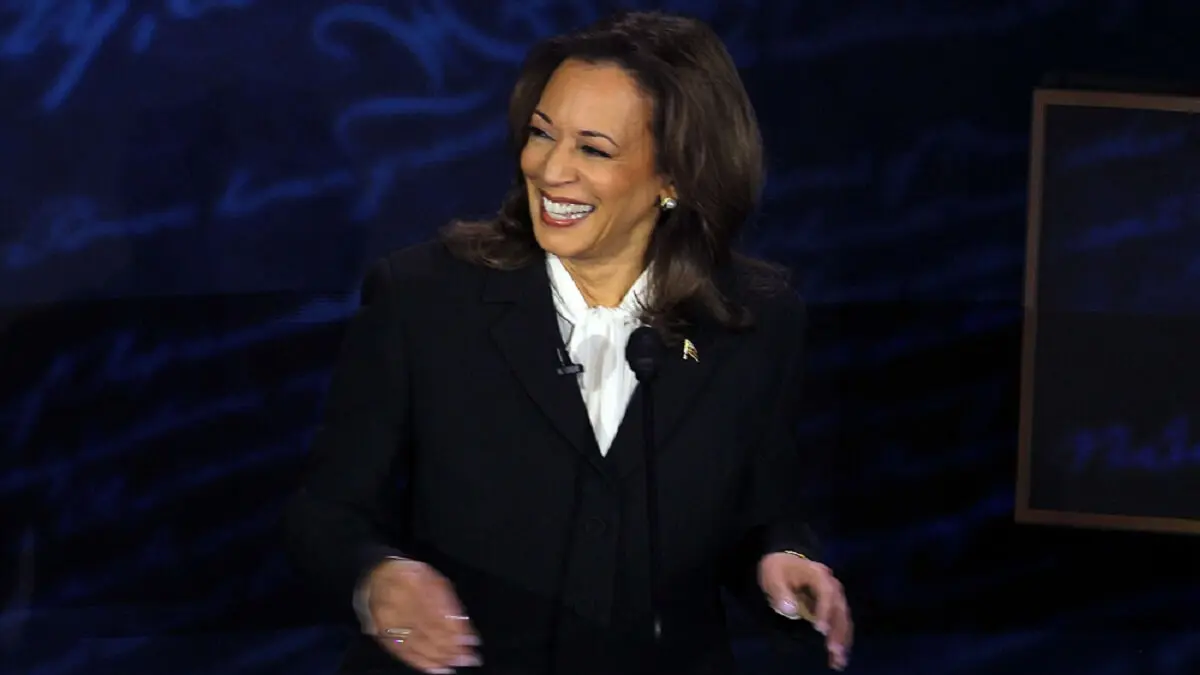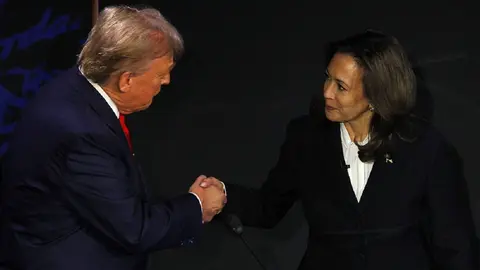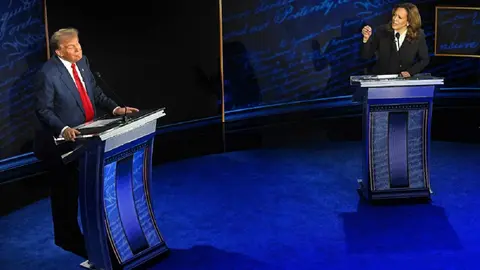For Europeans, Kamala Harris won the debate over an angry Trump

For the most part there is consensus: Harris attended the debate much better prepared than her counterpart and took advantage of the occasion to show that she represents a more measured and even-tempered approach, as opposed to the unpredictability of a Trump who always tends to overreact and can get things out of his mouth such as migrants eating American pets.
In Spain, Televisión Española (TVE), in its daily summary, spoke of a ‘fierce debate’ and highlighted a Trump who ‘launched hoaxes and unfounded theories’, who didn't lower his aggressive manner for a second: ‘His eternal gesture of anger was eclipsed by the friendly face of vice-president Harris, because she managed to show that voting for Trump is a danger to the stability of the Americans. He was irascible and she was calm’.
As for the print media, the newspaper El País headlined that ‘Kamala Harris corners Donald Trump in a high-tension debate’ and stressed that the Democratic candidate's strategy to put the former president on the defensive, making him react with excesses, was a success.
‘Donald Trump and Kamala Harris staged a dog-faced, uncompromising debate in Philadelphia in which they clashed head-on on the main campaign issues: the economy, immigration, abortion, crime and respect for democracy. It was a lively, exciting, very tense debate, in which the battle lasted from the first question to the last; the Democratic politician was more capable of questioning’, according to the newspaper.
In another Spanish media outlet, ABC, Vanessa Guerra, an expert in non-verbal communication, said that during the debate it was possible to identify several hot points: the first was at the very beginning of the debate.
‘Harris enters the stage and heads towards the centre of the set while Trump heads straight for his podium. The candidate's action indicates a clear intention to avoid contact with the vice-president, but Harris goes over to wish him well and shake his hand. This implies entering her space and, in a way, occupying or even invading it. It's a show of strength, security and leadership on Harris's part,’ according to Guerra.
For the expert in body language, one of the high points of the debate occurs when the issue of abortion is addressed: ‘Kamala Harris's reaction during the speeches related to the issue of abortion is very significant because, although the gestures on her face show concern and affectation (with a downward expression and a hint of seriousness) during Trump's speech, her response expresses an emotional leap that leads her to show calm and confidence in the argument’.
ABC also highlighted a Harris who has grown up before Trump, who is asking to have another televised debate, something that the Republican candidate has rejected. A candidate who, in the opinion of David Alandete, in an article for the newspaper, had only one task: ‘To reinvent herself. To definitively leave behind the unpopular vice-president, the failed manager of the migration crisis and the losing candidate in the 2020 Democratic primaries’.
For its part, the daily El Mundo noted that both analysts and spectators gave Harris as the winner of the debate: ‘She has come out stronger, without having made any mistakes and managing to get on Trump's nerves. The vice-president prevailed in a fierce debate against the former president, whom the moderators repeatedly corrected for the hoaxes’.
‘The Democrat's plan could not have been simpler: present her more moderate and centrist side, take aim at Trump's ego and wait for his anger to do the rest. And it worked perfectly. She remained serene and smiling all night. Harris, unlike Hillary Clinton or Joe Biden in 2016 and 2020, was not obsessed with either dismantling her rival's falsehoods or exposing his programme’, stressed El Mundo.
In an article signed by Pablo Suanzes, correspondent in Brussels, it is stated that Harris's message was hopeful, and at no time did she resemble ‘the radical leftist and Marxist’ caricatured by the Republicans.
Josep Cuní, director of Radio Nacional de España's Las Mañanas, has been more cautious in analysing the true impact of the debate on the voters of both parties and, fundamentally, on undecided voters, after pointing out that the United States is a conservative country and, for this reason, it is better to be cautious when analysing what has happened.
Above all because the journalist insisted that there is a current of European intellectuals who converge with the vision of the Democratic Party in the United States, and this has prevented ‘for a long time Europe from understanding what the American citizen really feels and thinks’. Cuní also remarked that the left in Europe has nothing to do with what can be called the left in the American Union. ‘The United States is a conservative country in its habits, in its customs and, it must be said, in Europe we do not know its local realities’.
A comment in the same vein and less euphoric than the rest was that of Rocío Colomer, in a note published in La Razón, reminded readers that if the elections were held today, Harris would narrowly win in the popular vote, but would lose the Electoral College, which would mean victory for Trump.
‘It is worth remembering that, in the bizarre American system, presidential elections are actually fifty separate races in the states. Too many Democrats live in California and New York, some of them needing to move to swing states! Eight weeks is a long time in politics, but, at this point, Harris is a bit of an underdog. It's very close, though,’ Colomer said.
A clear defeat for Trump
The Guardian newspaper in the UK treated the 105-minute debate as a clear defeat for Trump as he was exposed for his lack of preparation for an event watched by millions of Americans.
In an article by Robert Tait, it was noted that Republicans were virtually unanimous that Trump had come second: ‘This is the difference between someone who is well prepared and someone who is unprepared. Whoever prepared Donald Trump should be fired’.
Harris also provoked what some here in Europe saw as a telling response when he told Trump that US allies considered him ‘weak’, seeing him as a fan of Vladimir Putin.
Another point that did not go unnoticed in Europe was when Trump shielded himself under the support of Víktor Orbán, prime minister of Hungary, to claim that he was a respected leader. The far-right Hungarian prime minister is not well regarded within the European Union (EU) for his harsh anti-immigrant policies, his friendship with Putin and for not supporting Ukraine's defence against Russian invasion.
The Guardian itself, in a late hour on Wednesday 11 September, just a day after the meeting, noted in its pages that Trump ‘lost’ the debate by taking an inappropriate approach to a number of issues in front of 67 million viewers. The Harris-Trump debate was watched by fifteen million more people than the Biden-Trump debate.
The future with Putin
Europe is looking for clues about the direction the US might take after next November's election, wrote Patrick Wintour, also for The Guardian.
‘The debate was followed as closely by European diplomats and politicians as by American voters, anxious to see who might be next installed in the White House and, more importantly, the direction a vital ally might take. There are European diplomats who do not underestimate Trump... never count him out,’ Wintour reiterated.
Meanwhile, in Germany, Michael Roth, chairman of the Social Democratic Party's foreign affairs committee in the Bundestag, claimed that Harris had managed to make Trump look ‘like an aged, old, angry and confused person’, despite having been in government for much of the past few years. ‘Harris has dismantled Trump on the open stage and positioned herself as a candidate of change. She deliberately provoked Trump, and he fell for it.’
In turn, the German Foreign Ministry, in a tweet on X, responded to Trump's criticism of Germany's energy dependence on Russia by writing: ‘Whether we like it or not, Germany's energy system is fully operational, with more than 50% renewable energy. And we are shutting down, not building, coal and nuclear plants. Coal will be off the grid by 2038 at the latest’.
Another point that did not go unnoticed from the debate and is floating around in the air here in Europe has to do with Trump's refusal to say whether he wanted Ukraine to defeat Russian dictator Vladimir Putin. The Republican candidate indicated that he only wanted the war to stop and lives to be saved.
Meanwhile, in France's Le Monde, Piotr Smolar wrote that a Harris on the offensive won the debate over Trump in a first head-to-head with very different views on the economy, abortion, immigration and guns.
‘Suddenly, Donald Trump looked much older... he grimaced and was getting smaller. He gesticulated, no sarcasm, no oxygen. On Tuesday 10 September, during his first televised confrontation, the former president clung to his hoaxes, like a punctured buoy, in front of Kamala Harris,’ Smolar said.
In Italy, Corriere della Sera, criticised Trump's lacklustre performance and his obsession with illegal aliens and the collusion that they hunt cats and dogs for food.
However, Italian analyst Federico Rampini, in a video in the same media, pointed out that the debate had been lousy and that Americans are still unaware of the government plans of both candidates.
‘After the televised confrontation between Donald Trump and Kamala Harris, we are all so busy wondering whether Taylor Swift's endorsement will change the votes in favour of the Democrats and counting the points scored by one or the other... and we have overlooked that neither of the two candidates for the Presidency of the United States has clearly stated what their government programme is and how they intend to finance it,’ Rampini said.
Finally, Germany's Süddeutsche Zeitung reported the debate as a major blow to Trump's ego and highlighted the embarrassing hoax that immigrants eat Americans' pets and called Trump a lying 'machine'.



